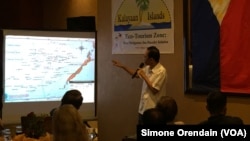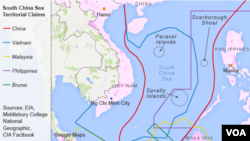The Philippines kicked off a campaign Sunday night to push for a proposed “ecotourism zone” in the middle of the disputed Spratly Islands in the South China Sea.
A U.S.-based advocate for Philippine causes is proposing the idea of the ecotourism zone in the hotly contested Spratlys.
China, Vietnam and Taiwan claim practically the entire sea, while the Philippines, Malaysia and Brunei have partial claims.
Eric Lachica, with the U.S.-Pinoys for Good Governance, said the tourism zone would be the best way to handle the competing claims because each of the claimants has developments among those outcroppings.
'Protect our interests'
“Let’s protect our interests. China has nine. The Philippines has nine. Malaysia has five. Vietnam has 48. So I think to protect what they’ve got, this is a perfect solution. It minimizes their military headaches, at the same time it improves their economic position,” Lachica said.
Right now, at least three claimants – Malaysia, Vietnam and China – have tourist destinations among the Spratlys and other contested outcroppings in the South China Sea.
Lachica said he came up with the plan after meeting Eugenio Bito-onon, the mayor of the Philippine-controlled islands in the Spratlys, locally known as the Kalayaan Group of Islands.
Bito-onon told reporters in Manila Sunday he has had this idea of “tourism for peace” for quite some time.
“But in my capacity as a local government, as municipality of Kalayaan, that would take a long time for me to prepare to be able to really reach a level of convenience where we can bring tourists there. And without also the enabling policies at the national level, it would be difficult for me,” he said.
Ideal scenario
Lachica said the ideal scenario would be to have a Philippines Senate resolution backed by the office of the president that the Philippines could then propose to China and the 10-state Association of Southeast Asian Nations.
Bito-onon said he envisions tourist trips from the main occupied island of Thitu to two nearby tiny, pristine islands also controlled by the Philippines.
He points out that a planned shelter at Thitu could serve as a respite during inclement weather to tourists of all other claimant-controlled outcroppings.











